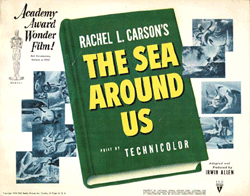| The Sea Around Us | |
|---|---|
 Film poster for The Sea Around Us | |
| Directed by | Irwin Allen (uncredited) |
| Written by | Irwin Allen |
| Based on | The Sea Around Us 1951 novel by Rachel L. Carson |
| Produced by | Irwin Allen |
| Narrated by | Don Forbes Theodore von Eltz |
| Edited by | Frederic Knudtson Doane Harrison (as Dean Harrison) |
| Music by | Paul Sawtell |
Production company | |
| Distributed by | RKO Radio Pictures |
Release date |
|
Running time | 62 minutes [2] |
| Country | United States |
| Language | English |
The Sea Around Us is a 1953 American documentary film written and produced by Irwin Allen, based on the book of the same name by Rachel L. Carson. It won the Academy Award for Best Documentary Feature. [3]